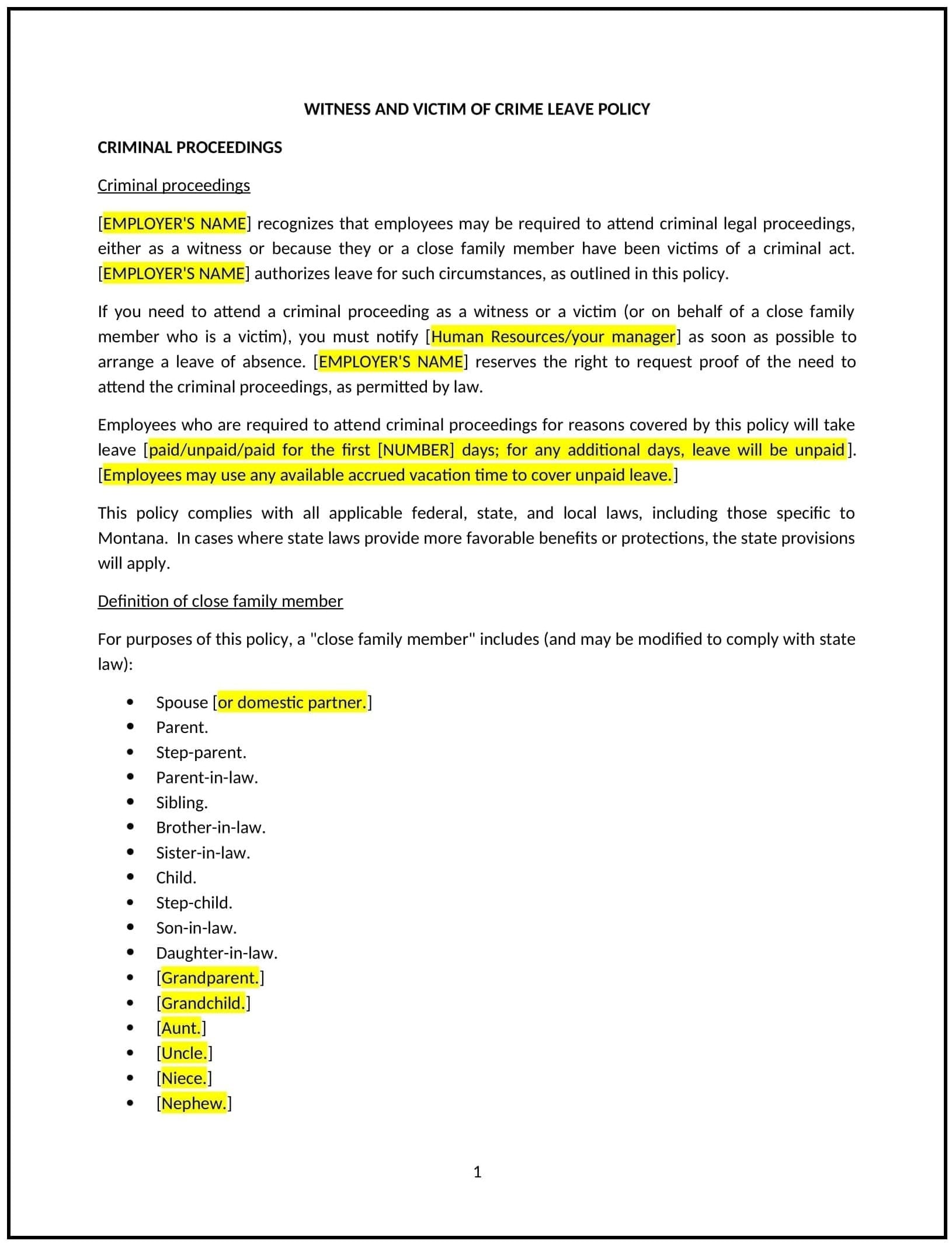Witness and victim of crime leave policy (Montana): Free template
Got contracts to review? While you're here for policies, let Cobrief make contract review effortless—start your free review now.

Customize this template for free
Witness and victim of crime leave policy (Montana)
A witness and victim of crime leave policy helps Montana businesses provide support to employees who are victims of or witnesses to crimes, allowing them time off to participate in legal proceedings or to recover from the trauma associated with the crime. This policy outlines the circumstances under which employees can take time off, the procedures for requesting leave, and the documentation required for such leave.
By implementing this policy, businesses can support employees during difficult times, ensure they have the time needed to participate in the legal process, and foster a compassionate and supportive work environment.
How to use this witness and victim of crime leave policy (Montana)
- Define eligibility: The policy should specify the conditions under which employees are eligible for crime-related leave, including being a direct victim of a crime or a witness required to testify in legal proceedings related to the crime.
- Set the process for requesting leave: The policy should outline the steps employees need to follow to request leave, including advance notice requirements, documentation needed (e.g., court subpoenas, police reports), and the timeline for submitting requests.
- Specify the duration of leave: The policy should establish the amount of time off employees are entitled to take, whether it is paid or unpaid leave, and how it is managed in conjunction with other leave policies, such as vacation or sick leave.
- Address documentation requirements: The policy should clearly state the types of documentation employees must provide to validate their leave request, such as a subpoena, police report, or other legal documents related to the crime or legal proceedings.
- Outline job protection during leave: The policy should specify that employees will retain job security during their time off for legal or recovery purposes, including the continuation of benefits and the protection of their position during the leave period.
- Set expectations for communication: The policy should require employees to keep their employer informed about the status of their leave and any changes to their availability, including providing updates on court dates, recovery, or other relevant information.
- Review and update regularly: The policy should be reviewed periodically to ensure it remains in alignment with changes in state or federal laws, company needs, and employee expectations.
Benefits of using this witness and victim of crime leave policy (Montana)
This policy provides several key benefits for Montana businesses:
- Supports employee well-being: Offering leave for crime victims and witnesses demonstrates the company’s commitment to employee well-being, offering them the time and space needed to recover or participate in legal proceedings without added stress.
- Reduces absenteeism: By providing formal leave options for these situations, businesses can reduce unplanned absenteeism and ensure that employees have access to the support they need.
- Fosters a supportive workplace culture: A clear policy for supporting crime victims and witnesses fosters an environment of trust and compassion, enhancing employee morale and job satisfaction.
- Promotes legal participation: Allowing employees time off to testify or attend court proceedings ensures that the company supports legal processes and compliance with the law, promoting a sense of social responsibility.
- Increases employee loyalty: By offering time off for crime-related issues, businesses can build goodwill and loyalty among employees, as they feel supported during difficult times.
- Helps prevent legal issues: A clear, documented policy can help businesses avoid potential legal issues related to employment law and employee rights, ensuring that employees are treated fairly when they need to take time off.
Tips for using this witness and victim of crime leave policy (Montana)
- Communicate the policy clearly: Ensure that all employees are aware of the policy, including eligibility criteria, how to request leave, and the documentation required. This can be done through the employee handbook or internal communications.
- Be flexible and empathetic: Recognize that employees who are victims of or witnesses to crime may need additional support. Be flexible with their needs and provide reasonable accommodations to help them during difficult times.
- Document leave requests: Ensure that all leave requests related to crime incidents are documented thoroughly, including the reason for the leave, the documentation provided, and the dates of the leave taken.
- Coordinate with legal authorities: If necessary, work with local law enforcement or legal representatives to verify the need for leave and ensure that employees are supported through their involvement in legal proceedings.
- Monitor and track leave: Regularly track employee leave requests for crime-related matters to ensure that policies are applied fairly and consistently across the company.
- Review the policy periodically: Periodically review and update the policy to ensure it remains compliant with changes in state law or company practices, and that it continues to meet the needs of employees.